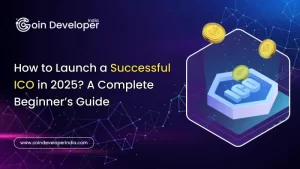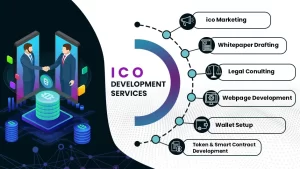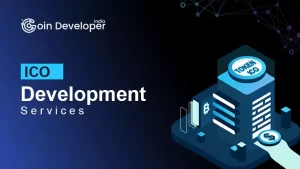Launching an ICO (or Initial Coin Offering) is one of the most popular ways today for blockchain-based startups to raise funds.
But do you know what powers the entire ICO process behind the scenes? The answer is smart contracts. It is a self-executing program that automates everything from collecting funds to distributing tokens.
In the world of blockchain, smart contracts play an integral role in ensuring that ICOs are secure, transparent, and trustless. They eliminate the need for middlemen and reduce human error.
In this blog, we’ll talk about how an ICO smart contract works, why it is important, and how it helps make token sales more efficient and reliable for both businesses and investors.
Let’s have a look!
What is an ICO?

ICOs, or Initial Coin Offerings, are a way for newbies and businesses to raise funds seamlessly. These have democratized the investment and fundraising process, which allows anyone to invest in early-stage blockchain-based projects.
Unlike traditional fundraising methods, which basically require navigating the complicated regulations involved, ICOs offer a straightforward and decentralized approach that has gained the attention of both investors and entrepreneurs.
What is a Smart Contract?
A smart contract is a self-executing program that automatically executes when certain conditions are met. It works like a digital agreement between two or more parties. Once it’s deployed on the blockchain, no one can change it, which makes it secure and tamper-proof.
These are widely used in cryptocurrencies, DeFi, NFTs, games, and many blockchain-based platforms. They help automate processes, reduce costs, and build trust through transparency and security.
Why Use a Smart Contract for ICOs?
Smart contracts are the backbone of ICOs. They allow startups and blockchain-based projects to raise funds easily. Here’s why they are essential:
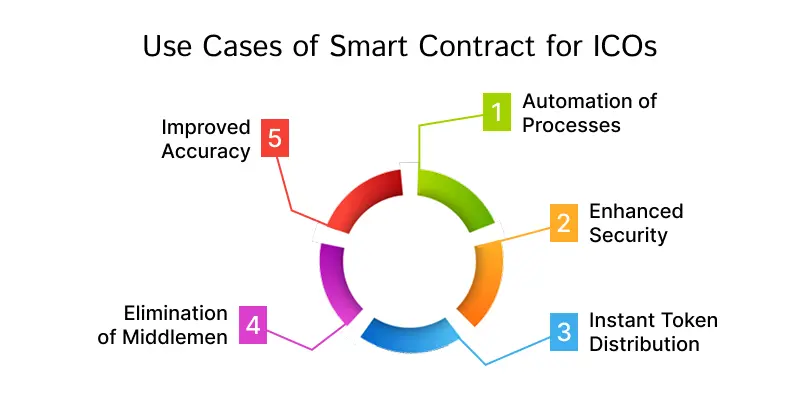
- Automation of Processes
One of the main benefits of using ICO smart contracts is the automation they bring in. These self-executing contracts automatically handle the entire ICO process without interference from humans. The process is completely automated, which ensures efficiency and eliminates the chance for manual errors.
- Enhanced Security
Security is a major concern in this era. That’s where smart contracts step in, as they provide enhanced security since, once they are deployed on the blockchain, they become immutable. This means that no one can alter or tamper with the contract’s code.
- Instant Token Distribution
Smart contracts offer real-time execution, which means that once a crypto token sale is completed, the smart contract immediately distributes the corresponding tokens to their wallet. This improves the user experience by reducing wait times and delays.
- Elimination of Middlemen
In traditional financial processes, ICOs often rely on intermediaries to handle payments and documentation. Smart contracts eliminate the need for middlemen since they automate the entire process on the blockchain. This furthermore reduces costs, increases efficiency, and streamlines the blockchain fundraising process.
- Improved Accuracy
Since smart contracts are built on code, there is no chance of human error. The rules and conditions are written in logic that is automatically executed when conditions are met. This high level of precision removes any mistakes that could occur during manual processes and ensures that investors get what they signed up for.
Components of an ICO Smart Contract
If you are planning to launch an ICO, it’s important to know the essential components of a smart contract. Here’s how it goes:
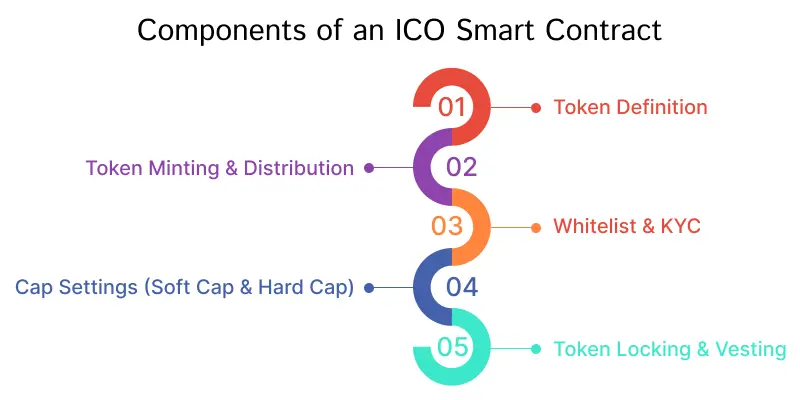
-
Token Definition
The token is at the core of the ICO that is being offered. Most of the ICOs use the ERC-20 standard to ensure compatibility with wallets and exchanges. The contract defines key attributes of the token, such as:
- Name (e.g., “MyToken”)
- Symbol (e.g., “MTK”)
- Decimals (usually 18)
- Total supply of tokens available
-
Token Minting & Distribution
Crypto tokens can either be pre-minted (which means that they can be created at the time of contract deployment) or minted as investors contribute. The smart contract typically includes logic to allocate tokens to stakeholders and distribute tokens based on contributions. This automation ensures a fair and transparent token distribution process.
-
Whitelist & KYC
In some of the jurisdictions, compliance with KYC regulations is important. Whitelisting ensures that only pre-approved participants can join the sale, which adds a layer of legal compliance and security to ICOs.
-
Cap Settings (Soft Cap & Hard Cap)
Cap settings are important in determining how much funding an ICO aims to raise. They help balance expectations for both the project team and investors, which ensures that the ICO neither underfunds nor overfunds the project.
To ensure this, soft cap and hard cap logic in the smart contract is implemented. Basically, the soft cap represents the minimum amount of funds the project needs to proceed. On the other hand, the hard cap defines the maximum amount the ICO will accept.
The smart contract functions as in:
- If the soft cap is not met, funds are held or refunded.
- Once the hard cap is reached, further contributions are blocked.
-
Token Locking & Vesting
After a successful ICO, one of the biggest threats that comes is the sudden sale of large token holdings by stakeholders. This is where token locking and vesting contracts come into play.
- Token locking restricts certain wallets from transferring their tokens for a predetermined period after the ICO.
- Vesting gradually releases tokens over a set period.
How an ICO Smart Contract Works – Step-by-Step
An ICO smart contract is basically an automated program coded on a blockchain that handles the entire fundraising and token distribution process. Let’s have a look at how it works:
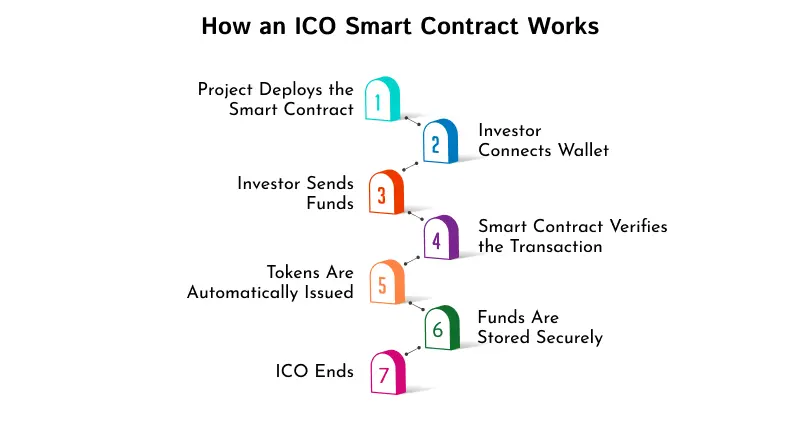
Step 1: Project Deploys the Smart Contract
The first step is when developers create a smart contract. It contains all the rules of the ICO, such as the start and end date, how many tokens will be sold, the token price, and how much money they aim to raise.
Once it gets ready, they deploy the smart contract to the blockchain, which makes it accessible to everyone.
Step 2: Investor Connects Wallet
During the ICO period, investors who want to buy tokens visit the project’s website or app. They connect their crypto wallets to the platform, which allows them to send funds directly to the smart contract.
Step 3: Investor Sends Funds
Once connected, the investor chooses how much cryptocurrency they want to contribute and then sends it to the smart contract.
The smart contract is programmed to receive and recognize this transfer. There’s no manual processing needed – it instantly understands who sent it and how much.
Step 4: Smart Contract Verifies the Transaction
Before accepting the funds and issuing tokens, the smart contract checks for a few conditions:
- What are the start and end dates of the ICO?
- Has the maximum fundraising amount been reached?
- Is the investor whitelisted?
- Has the investor followed the minimum and maximum contribution limits?
If everything works out, the transaction proceeds. In case it’s not, the transaction is rejected and returns the crypto automatically.
Step 5: Tokens Are Automatically Issued
If the contribution is valid, the smart contract automatically calculates how many tokens to send. For instance, if the price of the token is 1 ETH = 1000 tokens, and the investor sends 5 ETH, they get 5000 tokens. These tokens are instantly transferred to the investor’s wallet.
Step 6: Funds Are Stored Securely
The crypto sent by investors is collected by the smart contract. Sometimes, it goes directly to the project’s wallet. Other times, the funds stay inside the smart contract until certain conditions are met.
Step 7: ICO Ends
Once the ICO period gets over, the smart contract takes action based on the following results:
- If the soft cap is reached, the project can withdraw the funds.
- If the soft cap is not reached, the smart contract refunds the money to the investors.
It’s a Wrap
That’s it for this blog!
The benefits of using smart contracts in ICOs offer a wide range of benefits, such as increased transparency, efficiency, and security. These provide a decentralized and secure platform for executing agreements automatically.
If you are considering launching an ICO soon, it is important to partner with an experienced ICO development firm. And, in that case, Coin Developer India stands out as the best!
We specialize in offering end-to-end solutions to help your project gain enough potential investors. From coding a bug-free smart contract to creating an ICO platform, our team of experts are there to help you every step of the way.
Get in touch with us, and let’s start your ICO launching journey!
FAQs
- What is an ICO smart contract?
An ICO smart contract is a code written on a blockchain that automates the process of raising funds for a new cryptocurrency project. It is responsible for receiving funds, verifying contributions, and issuing tokens to investors.
- What blockchain is best for ICO smart contract development?
Choosing the best blockchain for developing an ICO smart contract isn’t straightforward, as it depends on the specific needs and goals of the project.
However, Ethereum has been considered one of the best platforms due to its established infrastructure, large developer community, and widely adopted ERC-20 token standard. Yet, some of the other blockchains you can consider are BSC, Solana, Cardano, Polkadot, and Avalanche.
- How much does it cost to build an ICO smart contract?
The cost to build an ICO smart contract can vary widely depending on the complexity of the project, the developer’s expertise, and the features included.
On average, the basic smart contract for an ICO may cost somewhere between $500 and $2,000. Whereas an advanced smart contract may range from $2,000 to $7,000. To get a quote for your project, reach out to us today!
- Are ICOs legal in 2025?
Legality depends on your country’s and jurisdiction’s laws. In some regions, ICOs must comply with KYC/AML regulations and may be treated as securities offerings. However, it is always considered a wise decision to consult a legal advisor before launching an ICO.
- Do I need a developer to create an ICO smart contract?
Yes, of course! That’s because creating a secure and reliable ICO smart contract requires knowledge of blockchain development. If you lack knowledge in the field, ensure that you reach out to our team of experienced smart contract developers at Coin Developer India for this.



